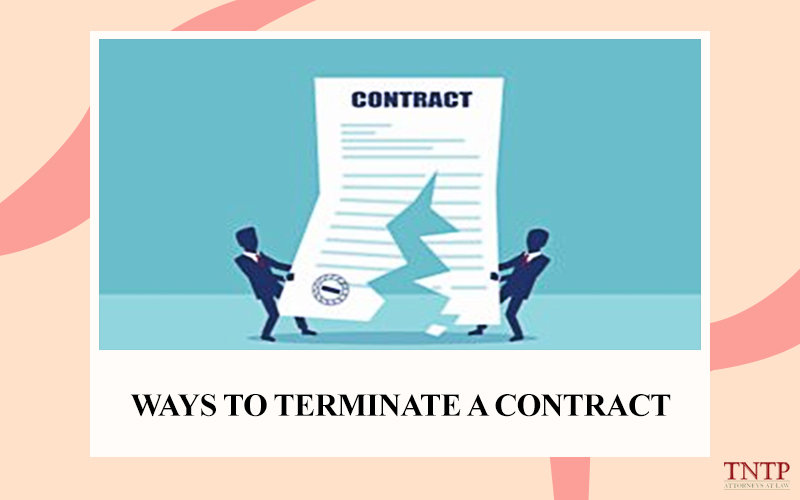Currently, each enterprise is aware of the significance of drafting, concluding, and implementing Contracts, especially commercial Contracts. Tightly drafting the Contract, implementing and terminating the Contract in accordance with law and the agreement in the Contract will limit disputes arising from the Contract. In this article, we will analyze some ways of Contract termination so that the enterprise can note and implement compliance with the law.
1. Concept of Contract, Contract termination
Contract means an agreement between parties on the establishment, change, or termination of civil rights and obligations.
The termination of the Contract can be interpreted as the termination of the implementation of the agreements made by the parties when they entered into the Contract. The obligor is not responsible for continuing to execute the duty, and the obligee cannot compel the obligor to do so. Depending on each case of Contract termination, each party may suffer different legal consequences such as the penalty for violation, compensation to the aggrieved party,…
2. Contract termination ways
The Contract will terminate in one of the following ways:
(i) The Contract has been completed
This is a typical scenario that leads to the termination of the Contract as well as the parties’ preferences when entering into the Contract. When the parties have performed their Contractual obligations accurately and entirely, the Contract is deemed completed. Accurately and entirely performing obligations is defined as implementing the whole agreement on the subject matter in the Contract (complying with the scope of work, delivering goods with the correct quantity, type, quality,…)
For a Contract whereby only one party has an obligation (unilateral Contract), the Contract will be completed when the obligor completes its obligations. For a Contract whereby each party has an obligation to the other (bilateral Contract), the Contract will be completed when all parties have accurately and entirely completed their obligations to the other party. The Contract is not deemed completed if just one party completely fulfilled its obligations while the other party. has not performed or performed improperly or inadequately,
(ii) The parties so agree
A Contract is just an agreement between the parties. Therefore, the parties may agree not to continue the Contract performance during the Contract performance period; accept the Contract liquidation when it is due even though the obligor has not fully performed obligations; offset obligations; or replace obligations. The parties need to agree on legal consequences after terminating the Contract. However, the agreement to terminate the Contract will be considered a violation of the law if this agreement is to avoid performing obligations with a third party.
(iii) Where a Contract is only able to be performed by a particular natural person or juridical person having entered into the Contract, and that particular natural person dies or that juridical person ceases to exist
A particular natural person dies or that juridical person ceases to exist that concluding Contract will lead to the Contract termination if it satisfies two conditions: The Contract must be performed by such natural or juridical person; The Contract can be performed by other individuals or legal entities, but the performance cannot be transferred to another subject (no one can replace or inherit the Contract).
If a Contract requires many persons to perform the same task or multiple legal entities to undertake the same task, the Contract remains valid with the remaining subjects even if one individual dies or a legal entity ceases to exist.
(iv) The Contract is canceled or unilaterally terminated
Although both the cancellation and the unilateral termination cause the Contract termination, the legal effects of these are distinct. When a Contract is canceled, it is no longer valid from the moment of signing and no Contract ever existed. The legal consequences of a canceled Contract are dealt with the same as the Contract was declared invalid. When a Contract is unilaterally terminated, it is only invalid for the part that has not been performed, the part that has been performed is still valid.
(v) The Contract is not able to be performed because the subject matter of the Contract no longer exists
The Contract’s object is the mandatory content in the Contract. When Contract’s object ceases to exist, the purpose of entering into the Contract cannot be achieved. Therefore, the parties cannot continue to perform the Contract and the Contract will terminate, however, this does not mean the termination of the rights and obligations. In case the object ceases to exist, the parties may agree to replace it by terminating the previous Contract and entering into a new Contract or compensating for the damage.
(vi) The basic change of circumstances
A situation changes substantially when the following conditions are fully satisfied:
- The circumstances change due to objective reasons that occurred after the conclusion of the Contract;
- At the time of concluding the Contract, the parties could not foresee a change in circumstances;
- The circumstances change such greatly that if the parties know in advance, the Contract has not been concluded or concluded, but with completely different content;
- The continuation of the Contract without the change in the Contract would cause serious damage to one party;
- The party having interests adversely affected has adopted all the necessary measures in its ability, in accordance with the nature of the Contract, can not prevent or minimize the extent of the effect.
When circumstances change fundamentally, the Contract terminates upon the following conditions:
- At least one party has their benefits affected when the circumstances change fundamentally;
- The parties cannot agree to amend the Contract within a reasonable time;
- One of the parties requests the court to terminate the Contract.
Above are the ways of Contract termination in accordance with the law. The enterprise should remind and pay attention to these ways to avoid arising disputes in business activities.
You may need Principal contract in commercial activities
TNTP and Associates International Law Firm
Attorney: Nguyen Thanh Ha
Email: ha.nguyen@tntplaw.com







